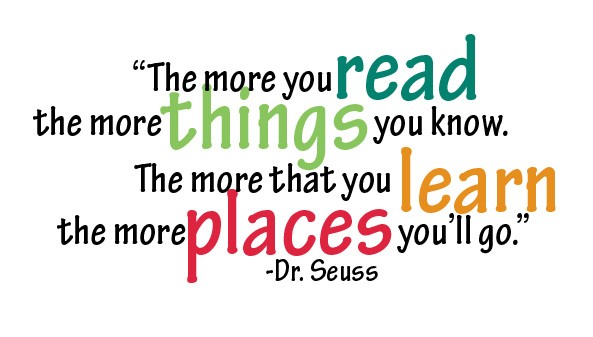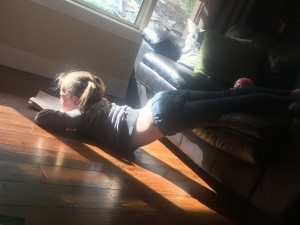Inspiring a Love for Reading in Your Kids
I am a self-professed book lover. Secretly, I would love to find a job where they paid me to read all day. Reading takes me to places I will never go and puts me in the minds of characters I would have trouble understanding otherwise. Reading didn't always come easily for me; I was a late starter in my reading journey and spent more time in the Learning Assistant's office than I did the library in my primary years. Thankfully, I had parents who knew the importance of reading to kids. Some of my fondest memories are of being read to (even into my teen years). Finally, it was listening to stories of Pa, Laura and Mary and all the Little Women that inspired a life-long love of reading and a passion to help others discover the same.
However, in this generation we are faced with some challenges – a fuller calendar (I'm trying to eliminate the word busy) and brightly lit, instant gratification devices that have new apps and games available daily. Books, for some, have become a thing of the past and for many of our children (and adults) reading has become a chore. The truth is when students don't LOVE it, they generally won't CHOOSE it. So as parents and educators how do we inspire our children to love reading?
1. READ – Read yourself. As a family, anytime, anywhere. Statistics show that children are more likely to read when they see their parents reading. If you aren't in the habit of reading already, set time aside to read together as a family. Regardless of the age of your children, you can read together and to each other. Our kids are influenced by the things we DO more than what we SAY. What you read isn't as important as the reading itself. I often have students and adults say they just don't like reading to which my response is, "you just haven't found the right book yet." Help your kids discover reading material that they find interesting, this can be something you do together. For some kids and adults, finding the right material can take a little exploring.
2. TALK – Talk about what you've read to each other as a family. Reading isn't just about information gathering, it's a dialogue between ourselves, the text and to each other. My children love when I'm in the middle of a book and I put it down to talk to them about something I've just read, or read them a funny part. Conversations about reading are almost as important as the reading itself.
3. CONNECT – Connect what you're reading to everything and anything. When I talk about reading to my kids, I often connect the stories and characters to myself, to other stories and to real life circumstances. I also love connecting it to what my kids are reading, and often read the same books as they are. This gives us great things to talk about and areas to connect. I find it easier to talk about big issues that the characters are dealing with, than to talk about those big ideas in isolation. When our teenage daughter was at the height of her "teenageness", books gave us a great place to connect and provided opportunities to talk about some tough issues (that just "happened" to be in the books I bought for her).
4. MAKE IT FUN – Reading shouldn't be boring. The more "fun" we can add to our reading the more our children will chose it. I love finding unique places to read (in a sunbeam, on a hammock, on the trampoline, upside down on the couch). It's great for our kids to see us having fun while we read. It's not a chore, it's a choice.
5. THINK – One of the best ways to suck the life and fun out of reading is to have to regurgitate the facts of what we just read. We mean well when we ask our kids comprehension questions to see if they understand; however, inadvertently we take the joy out of it and make it seem more like a chore. There are so many more ways to find out if our children are understanding what they read. My favourite line when my kids are reading is to sit next to them and ask them to "catch me up". Showing interest in the story that they are reading gives them an opportunity to tell me what they've just read (and if I want, check up on their understanding). Going deeper with our discussion about the books also is key to making reading more interesting. Ask them questions like: What character can you relate to? What part of the story made you mad/sad/happy? Would you recommend this story to others? Why or Why not? Remember, when our kids begin to LOVE reading it will become something they CHOOSE as life-long learners.
"There are many little ways to enlarge your child's world. Love of books is the best of all." - Jacqueline Kennedy Onassis
When you subscribe to the blog, we will send you an e-mail when there are new updates on the site so you wouldn't miss them.





Comments